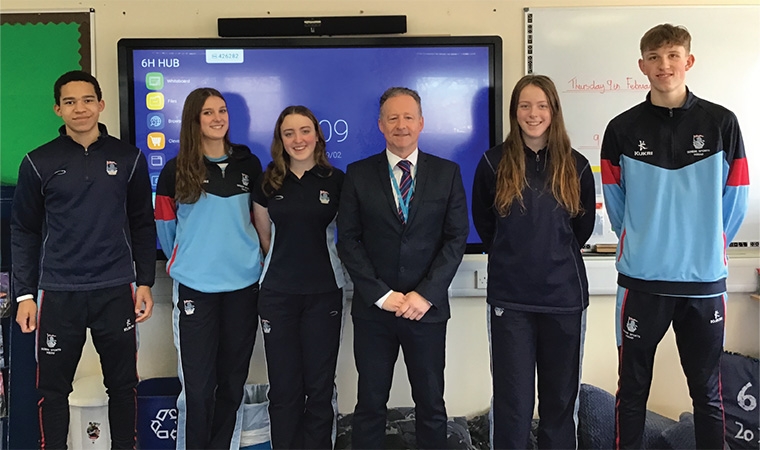Pupils reflect on Maths — No Problem! and the path to early GCSEs
“I remember the chat. There was a lot of chat and there was a lot of collaboration.”
In 2015-16, my school, Wellington Prep in Somerset, made the fundamental decision to adopt a mastery approach by introducing Maths — No Problem! in Years 1–4. The Year 4 cohort led the way, becoming the first to tackle the Year 4 curriculum, then in consecutive years the Year 5 and Year 6 curricula.
In June 2022, five of these ‘originals’ took the GCSE in maths a year early, scoring highly. I met with them recently to discuss their memories of switching to Maths — No Problem! and the impact it had. We also discussed how it might have helped them achieve their GCSE grades.
I’d like to thank Tom, Matthias, Lara, Seren and Georgia for generously agreeing to share their experience.

(L-R) Matthias, Seren, Lara, Roger Hitchin, Georgia and Tom.
What was it like to change to the Maths — No Problem! Programme?
Lara: “It felt really different because you weren’t doing times tables all the time. We were used to traditional ways, and then it was a new way of doing maths. Once we got used to it, it was really helpful.”
Lara: “When we first used bars for word problems, that was so weird to me, I never thought of doing it that way — we had never been taught that before.”
Seren: “You learnt new ways —"
Matthias: "It was quite a graphic and visual way of doing maths."
Tom: "It was also easier to look at as it was quite a colourful book.”
What was it like to use bar modelling?
Georgia: “It just made it so much more clear."
Seren: “Seeing it now, it makes me wish we could still use it.”
Georgia: "For people that don’t like doing maths necessarily with numbers — just putting it as a bar makes it clear. You can then ‘see it.’”
Lara: “It just shows you what to do. You just have to count the bars. I feel like that’s the easy bit. Without the bars, you can be unsure as to ‘what bit do I have to divide?’ In this, you’re seeing — you can just count the bars.”
Roger Hitchin: “Back in Year 4, I remember you used to say ‘Bar models help you see’. I still use that quote now!”
Lara: “I was so inspirational! It’s true though."
Georgia: "Instead of keeping it all in your head, you put it down.”
Matthias: “It made it easier to go into algebra later.”
Seren: “It was an easy transition.”
Lara: “Also, for people who are visual learners, in your head you can remember the bars. You don’t have to remember ‘this equals x or y’ or whatever.”
Transform Your Maths Assessment
Insights — our online assessment tool — gives you instant, powerful data to identify gaps and improve results.

What memories do you have of when we started?
Seren: “Before it was just a bit boring. Most lessons before, we did times tables and then we would split off. It seemed to be mainly about tests really. You’d have a times table test and it wasn’t really everyone working as a class. This makes you work together more, rather than just on your own.”
Tom: “I remember the chat. There was a lot of chat and there was a lot of collaboration.”
Lara: “I remember doing different parts, starting with the ‘In focus’ task. We used to work through so we could get to the challenge part.”
Was it better than what went before?
Georgia: “Yeah, definitely. You didn’t dread maths.
Lara: "You actually looked forward to it. I didn’t really enjoy it before – it was just another lesson that I’ve got to do.”
Tom: "It became more fun.”
Lara: "Oh, I really loved maths. But then everything we built on from this changed back when we went through Secondary. Your brain can’t hold all that information when you have to sit in rows and be quiet.”
Lara: “I can’t learn from just sitting by myself doing it because I don’t always understand. When you work collaboratively, you will usually get it! People that were smarter than you could help you.”
Lara: “We’d actually chat it through. You could share with the class and show what you mean — you would be processing it.”
Matthias: “If you missed out a step you could find out which step you missed out. Then it’s easier to see.”
Georgia: “If you see someone else doing that, that actually makes sense. That way doesn’t work but that way does. They’re easier to follow.”
Did it help later on, from Year 7 through to taking your GCSE?
Lara: “It was a foundation. For me, it was subconscious. I didn’t realise it was helping me but then you look back at some of these things and you think, yeah, I used that."
Tom: "It’s weird, you still use it.”
Matthias: “It’s like you’re using these ideas but you’re not aware you are. It influences you.”
Lara: “If we were doing advanced maths like this, it would be lovely.”
There is no doubt that Maths — No Problem! and the approach it imbues had a positive effect on these pupils. My overriding impression was that it was a positive feature in their primary schooling and they can still articulate their ideas and how they learn today.
